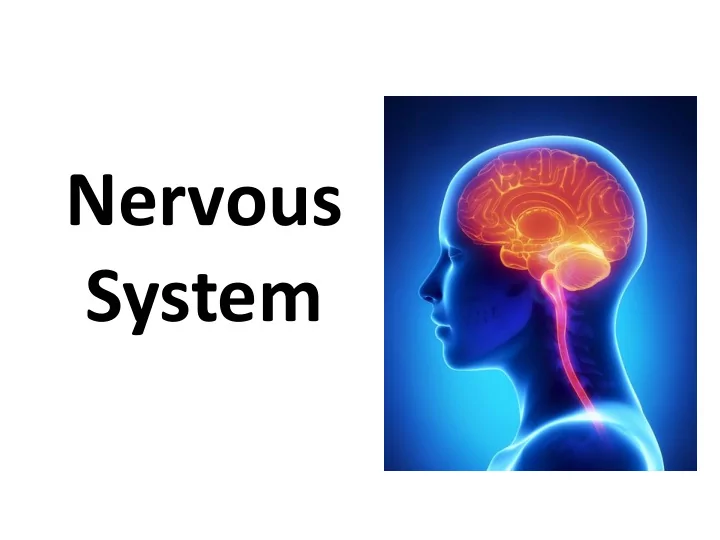

Nervous System
Function of the Nervous System • Receive sensory information, interpret it, and send out appropriate commands to form a response • Composed of neurons (functional unit of the nervous system)
Nervous System Endocrine System
Divisions of the Nervous System • Central Nervous System (CNS) – processes, interprets and stores information, composed of the brain and spinal cord • Peripheral Nervous System (PNS) – peripheral nerves that carry signals to and from the CNS
Divisions of the Nervous System
Structure of a Neuron
Schwann Cells and Myelin • Schwann cells are supporting cells that produce myelin (lipid insulator)
Types of Neurons
Three Types of Neurons • Sensory Neurons – Convey signals to the CNS from sensory receptors • Interneurons – Located within the CNS, integrate data and then relay signals to other neurons • Motor Neurons – Convey signals from the CNS to effector cells
Reflex Arc
Reflex Arc (Neural Circuit) Sensory Receptor Stimulus (External Sensory Neuron Cell or Internal) (Afferent) (5 Types) Interneuron (Brain and Spinal Cord) Response (Behavior, Effector Motor Neuron Secretion) (Muscle, Gland) (Efferent)
The Synapse
The Synapse • Site of communication between an axon (or synaptic) terminal of one neuron and another cell • Transmission of information between neurons occurs across synapses
Watch the following three videos on synaptic function: Molecular Mechanism of Synaptic Function When Cone Snails Attack How Cone Snails Paralyze Fish
What do you already know about action potentials?
Watch the following video: Nerve Impulse Animation
Membrane Potential • Neurons, like most cells, have an electrical charge difference ( membrane potential )
Resting Potential • At rest, the membrane potential is -70mV ( resting potential ) - maintained by the Na + /K+ pump • At rest, the neuron is said to be “ polarized ”
Threshold (“All or None”) • A neuron remains at rest until it receives a stimulus strong enough for the membrane to reach a voltage of ~ -55 mV ( threshold )
Action Potential (Nerve Impulse) • An action potential is the rapid reversal of electrical charge of the neuron membrane ( depolarized )
Steps of an Action Potential 1. Stimulus causes Na + gated ion channels to open and Na + rushes into the cell (initiation of action potential and depolarization)
Steps of an Action Potential 2. As Na + gated channels close, K + gated channels open allowing K + to rush out of the cell (repolarization)
Steps of an Action Potential 3. Na + /K + pump restores resting potential by pumping Na + ions back out of the neuron and K + ions into the neuron ( refractory period )
Watch the following two videos: How Nerves Work Animation Crossing the Divide: Neurotransmitters and the Synapse
Release of Neurotransmitters • As the action potential reaches the axon terminal, it causes Ca 2+ gated channels to open allowing Ca 2+ ions to rush into the cell • Causes synaptic vesicles to fuse with the membrane and release neurotransmitters into the synaptic cleft
Release of Neurotransmitters • Neurotransmitters (ligand): – bind to receptors on the postsynaptic cell – cause ion channels to open – Initiate an action potential by changing the membrane potential (depolarization • Esterases : enzymes that breaks down and recycles neurotransmitters in the synaptic cleft
Neurotransmitters • Chemical messengers that transmit nerve impulses (or action potentials ) across the synapse • Neurotransmitters can be stimulatory (excitatory) or inhibitory
Neurotransmitters Stimulatory Inhibitory Acetylcholine Serotonin Epinephrine GABA
Acetylcholine • Stimulatory neurotransmitter released at the neuromuscular junction
GABA • Inhibitory neurotransmitter released between neurons • Motor control, vision, regulates anxiety
A little bit more about the nervous system…..
Evolution of Nervous Systems
Brain Evolution in Vertebrates
Vertebrate Brain
Recommend
More recommend